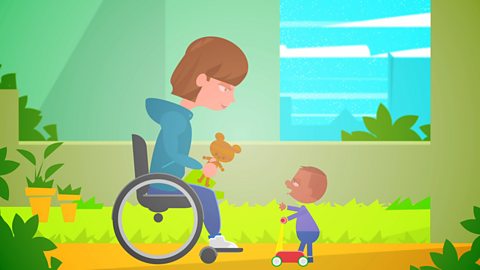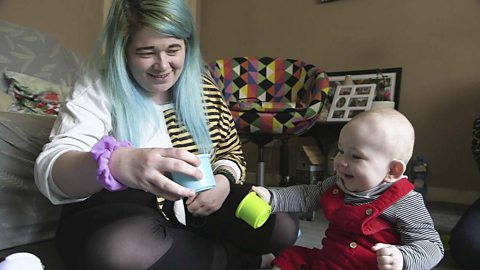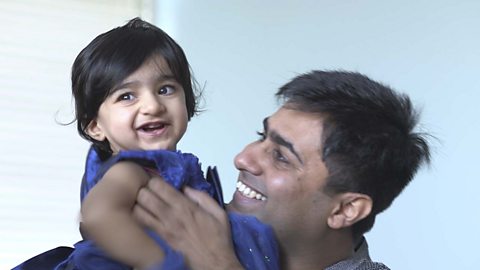Along with babiesÔÇÖ first steps, their first words are a milestone that lots of parents look forward to. But the line between babies making sounds and actually saying words is a bit blurry. After all, children often start out by saying words a little wrongly, so itÔÇÖs hard to know what counts.
We caught up with speech and language therapist Janet Cooper to learn more about how children come to say their first words, how parents can help them on their way and ways they can support children to build on their initial words.
When do children say their first words and what counts as a first word?
As with lots of things in development, children develop at different rates, but most children say their first word between ten and fourteen months.
Mum
Whenever she sees a new face or even a known face she'll say 'hiya'. Hiya!
Trish (Health visitor)
Her wee brain is obviously just growing and it's just taking so much in isn't it?
Cristina (SLT)
Between about 12 and 18 months is a really exciting time in your child's speech and language development. By 12 months of age, your babyÔÇÖs brain is already twice the size it was when they were born. There are more connections in a baby's brain than there are in an adult's and these connections are getting stronger and speeding up every day. All of this leads up to a really exciting moment - you're listening out for your baby's first words.
Trish
Do you remember when you heard her actually saying a word that you understood?
Mum
Yes, the first word was like 'mama'. Mama. And after that, after three or four days she didn't say 'mama' and then she went onto 'papa' but when she said 'mama', I just had tears in my eyes. She's trying to associate that word with me.
Cristina
With their first words, we know your baby is beginning their journey to develop their language system. These are often words that your baby will recognise from their environment and from their daily routines. That's why 'mama' and 'dada' are common first words as well as words like 'no' and 'bye bye'.
Mum
Look at the balls. Ball!
Dad
Ball?! Did you say ball? Was that the first time you said ball? Ball!
Cristina
The brain's frontal lobe is doing a lot of this work-processing language, memory and the months ahead, the words your baby knows are going to multiply and that is down to all of the foundations that your baby has laid dow nin the first few months of life - from learning, listening and taking turns with you.
Parents should be less concerned with children making exactly the right sounds and more with them giving sounds meaning, says Janet. ÔÇ£It may be that they make a sound along with pointing at something. If they use that sound consistently, then even if itÔÇÖs not clear, itÔÇÖs a symbol for the object the child wants and this should be classed as a word,ÔÇØ she says.
You can tell that your childÔÇÖs sound is meaningful if they seem to make the same sound for the same thing or action regularly. ÔÇ£So if the dogÔÇÖs in the room and they're looking at it and making the same sound over and over, thereÔÇÖs a good chance that that's their symbol for dog,ÔÇØ says Janet.
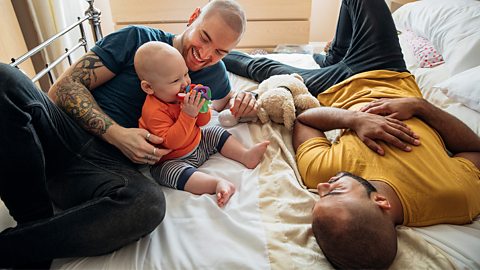
It might not be that they make the right sound straight away, they sometimes come up with some wonderful versions of words, but words are just symbols for something else. So if they're using it as a symbol for something recognisable, then that is a word.
ÔÇ£If you miss early word attempts, you might not realise that your child has actually started talking. So, for example, they might say, ÔÇÿdohÔÇÖ for dog, and the more the adult recognises this and reacts to it with praise and reinforcement, the more likely the child is to turn that into a word they use regularly.ÔÇØ

What first words are most common and why?
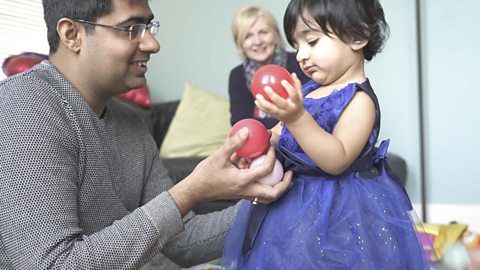
For most children, their first words tend to be things they experience regularly in their environment. And for a lot of children, that means that ÔÇÿmamaÔÇÖ or ÔÇÿdadaÔÇÖ is word number one.
The other reason some words come earlier is to do with the way their sounds are made with the mouth. ÔÇ£The easiest words babies can make involve ÔÇÿlips togetherÔÇÖ sounds, or sounds where you put the tongue on the bumpy bit behind the top teeth,ÔÇØ Janet tells us.
And thereÔÇÖs an evolutionary reason for babies starting to move their mouths this way when they talk. ÔÇ£Those parts of the mouth give extra sensory feedback in feeding, so that they can suckle and survive.ÔÇØ But what that also means is that when a child uses these parts of the mouth to make sounds, their brain gets better feedback about what theyÔÇÖre doing with their tongue and lips.
ThereÔÇÖs one more reason they make these mouth movements first ÔÇô theyÔÇÖre the ones they can see.
If somebody says a word like ÔÇÿmamaÔÇÖ, babies can actually see how they're making that sound as they make it. Sounds made further back in the mouth are harder to recognise.

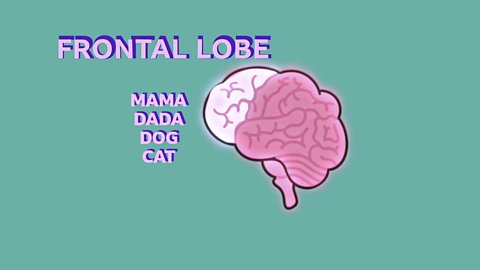
When babies babble, they use these easy mouth movements and easy vowel sounds to create repeated syllables like ÔÇÿbababaÔÇÖ and ÔÇÿdadadaÔÇÖ and a lot of babies will soon turn these into ÔÇÿmamaÔÇÖ and ÔÇÿdadaÔÇÖ.
However, other first words are often reported by parents too. When polled, our social media audience told us some of their babiesÔÇÖ more unusual first words, including ÔÇÿturtleÔÇÖ and ÔÇÿbubbleÔÇÖ. Janet suggests there is an easy explanation for this too.
Firstly, if a baby has a favourite turtle toy, itÔÇÖs likely to be something theyÔÇÖre interested in enough to talk about, while most babies will be motivated by bubbles if theyÔÇÖve played with them regularly too. ÔÇ£And again, both of these words use the front of the mouth. Sometimes when speech and language therapists are trying to teach first words to children who are behind with their speech, those will be the kind of words we'll pick for them to learn with those repetitive syllables.ÔÇØ

How can parents help children on the way to their first words?
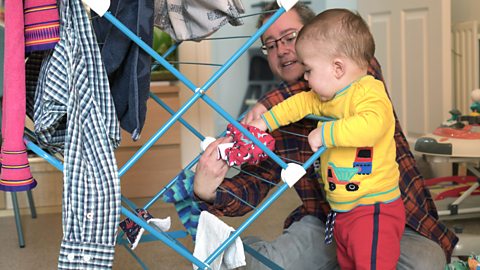
Janet has a few suggestions for ways you can help your child to start learning from birth:
ÔÇ£ItÔÇÖs about talking to them so that they can see your face regularly, but also observing, waiting and listening, so there is that serve and return pattern as in conversation.ÔÇØ Leave a pause and see how babies respond to you as you chat to them.
ÔÇ£Babies are born to mirror what they're seeing, so they will sometimes try and imitate some things you're doing. Even from day one, newborn babies can imitate you sticking your tongue out. As they get older, try babbling at them, and then waiting to see if they'll babble back.ÔÇØ
ÔÇ£Where you can see that they're making sounds while motioning or looking towards something, you can reinforce that by saying ÔÇÿyes, thatÔÇÖs aÔǪÔÇÖ and naming whatever it is, even if their attempt is really unclear.ÔÇØ Speech and language therapists sometimes call this ÔÇÿshared attentionÔÇÖ, because both you and baby pay attention to the same thing.

How can parents help children build on their first words?
Janet also has tips for building on the early words children say. ÔÇ£One of the best techniques is to start to add a word. So if the child says ÔÇÿbearÔÇÖ, you say ÔÇÿyes, teddy bearÔÇÖ. And that puts that word into context for the child, so they start to learn how those early sentences are built up. Don't correct them, just add a little bit more.ÔÇØ
Which sorts of words tend to come first?
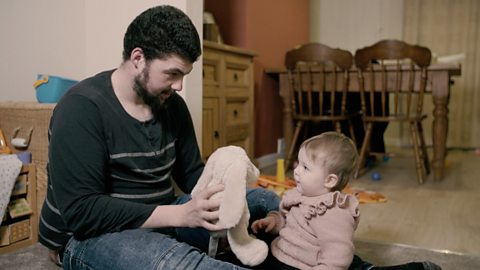
As well as ÔÇÿmamaÔÇÖ and ÔÇÿdadaÔÇÖ, most of childrenÔÇÖs first words are naming words for things around them, says Janet.
Nouns are concrete - theyÔÇÖre something babies can see or touch. So if theyÔÇÖre saying ÔÇÿnanaÔÇÖ, and theyÔÇÖre given a banana, it's instantly gratifying. Verbs and adjectives are more conceptual, and harder to put into context.
According to Janet, most babies will later add verbs in order to create sentences, while most describing words come later on. ÔÇ£ThatÔÇÖs where the strategy of adding words can really help,ÔÇØ says Janet.
And she has a word of caution when it comes to the things you buy for babies to play with. ÔÇ£A lot of books and and games for children encourage learning colours and counting, which are great for child development, but they're not the first things you need to introduce. They're only meaningful if you've got those naming words first.ÔÇØ

Should I worry if my child isnÔÇÖt saying much?
If your child isnÔÇÖt speaking much, you shouldnÔÇÖt necessarily be alarmed, says Janet. There are some positive indicators she says you should look out for, which suggest that children could soon be talking:
- The ability to share attention with you
- The ability to understand and follow instructions
- Pointing and gesturing
ÔÇ£If a child of nearly 2 came to me with all those skills, and they just weren't talking, I wouldn't be worried as long as theyÔÇÖre vocalising in some way and getting their needs met through gesture.ÔÇØ
I've seen children where they're saying nothing at 2, and then 2 months later, they are talking in sentences.
There are some things you can do to try and get children to make the leap to words too. ÔÇ£You might create some reasons and opportunities for children to say words. So it might be giving them a choice, which forces the child into saying the thing they want. Or it might be putting something slightly out of reach that they can normally get for themselves, so that they have to indicate to you that they want it.ÔÇØ
If youÔÇÖre concerned at all about your childÔÇÖs speech, then itÔÇÖs worth speaking to your health visitor. In the meantime, check out JanetÔÇÖs advice on when children start to speak and whether you should be worried about your childÔÇÖs speech.

